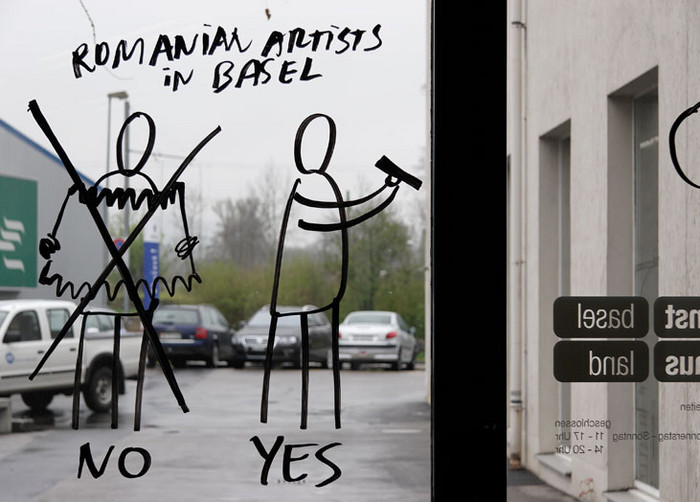Dan Perjovschi
05 Apr - 04 Jun 2008
DAN PERJOVSCHI
Fair enough
5 April 2008 – 4 June 2008
With his unpretentious, comic-like, political, humoristic, and ironic drawings on walls and windows, Dan Perjovschi (born in 1961 in Sibiu/Romania, lives in Bucharest) has definitely made a name for himself in the past few years. Perjovschi, who takes a keen interest in world affairs, is known in Romania also for his politically inspired performances as well as for his journalistic work for Magazine 22, a publication that came into being following the fall of the Ceausescu regime in 1987. With his artistically unique and direct language that is reminiscent of children’s drawings and Art Brut, he comments on international and local events, or on that world in which his works manifest themselves—the art scene. Equipped with a permanent marker or chalk, without having done any preliminary drawings, just with a rough idea about the content of his commentary, the artist arrives at the scene of his creative act. Dan Perjovschi takes an approach that is very specific to the venue and space in question. For the exhibition “Fair enough” to be staged at Kunsthaus Baselland, he has devoted his attention to the rows of windows that are a salient feature of the building. Working with daily newspapers, magazines, and an Internet connection to news agencies, the artist will produce new drawings on location, and reuse his existing repertoire of drawings with a view to further developing, reinterpreting, or logically complementing adjacent drawings. Growing up in a dictatorship, its collapse, and a society still grappling with the challenges of transition from communism to capitalism—all of these are recurrent topics in Perjovschi’s oeuvre. In drawings in the former Portuguese bank building Culturgest Porto, for example, the artist transformed a euro and a dollar logo into a hammer-and-sickle symbol, or he bled out the stars in the European flag. He seems to ask the following questions: How does the change from communism to capitalism unfold, and is the (Western) European system really the only way ahead? The transformation of values and standards occurring between 1968 and 2007 is summarized by Perjovschi in a drawing contained in his most recent book: The long-haired figure epitomizing 1968 gives the peace sign; opposite, there is a uniform-clad figure giving the finger. 1968 has the headline Love, whereas 2007 is entitled Fuck.
Perjovschi’s drawings express vitriolic comments and provide lucid and mordant analyses. They put controversial things in a nutshell, they are polemic and critical at the same time. Most strikingly, they are straightforward, in-your-face, and direct, and they brook no indifference.
Fair enough
5 April 2008 – 4 June 2008
With his unpretentious, comic-like, political, humoristic, and ironic drawings on walls and windows, Dan Perjovschi (born in 1961 in Sibiu/Romania, lives in Bucharest) has definitely made a name for himself in the past few years. Perjovschi, who takes a keen interest in world affairs, is known in Romania also for his politically inspired performances as well as for his journalistic work for Magazine 22, a publication that came into being following the fall of the Ceausescu regime in 1987. With his artistically unique and direct language that is reminiscent of children’s drawings and Art Brut, he comments on international and local events, or on that world in which his works manifest themselves—the art scene. Equipped with a permanent marker or chalk, without having done any preliminary drawings, just with a rough idea about the content of his commentary, the artist arrives at the scene of his creative act. Dan Perjovschi takes an approach that is very specific to the venue and space in question. For the exhibition “Fair enough” to be staged at Kunsthaus Baselland, he has devoted his attention to the rows of windows that are a salient feature of the building. Working with daily newspapers, magazines, and an Internet connection to news agencies, the artist will produce new drawings on location, and reuse his existing repertoire of drawings with a view to further developing, reinterpreting, or logically complementing adjacent drawings. Growing up in a dictatorship, its collapse, and a society still grappling with the challenges of transition from communism to capitalism—all of these are recurrent topics in Perjovschi’s oeuvre. In drawings in the former Portuguese bank building Culturgest Porto, for example, the artist transformed a euro and a dollar logo into a hammer-and-sickle symbol, or he bled out the stars in the European flag. He seems to ask the following questions: How does the change from communism to capitalism unfold, and is the (Western) European system really the only way ahead? The transformation of values and standards occurring between 1968 and 2007 is summarized by Perjovschi in a drawing contained in his most recent book: The long-haired figure epitomizing 1968 gives the peace sign; opposite, there is a uniform-clad figure giving the finger. 1968 has the headline Love, whereas 2007 is entitled Fuck.
Perjovschi’s drawings express vitriolic comments and provide lucid and mordant analyses. They put controversial things in a nutshell, they are polemic and critical at the same time. Most strikingly, they are straightforward, in-your-face, and direct, and they brook no indifference.

